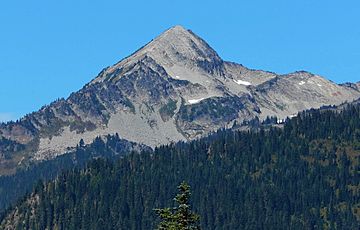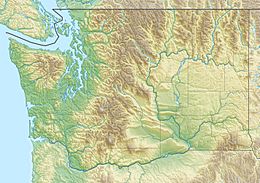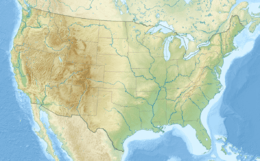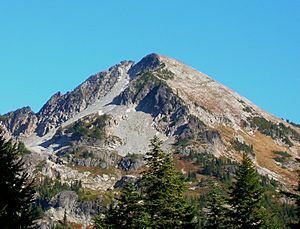Pyramid Peak (Pierce County, Washington) facts for kids
Quick facts for kids Pyramid Peak |
|
|---|---|

Pyramid Peak seen from the southeast
|
|
| Highest point | |
| Elevation | 6,937 ft (2,114 m) |
| Prominence | 497 ft (151 m) |
| Isolation | 1.26 mi (2.03 km) |
| Geography | |
| Location | Mount Rainier National Park Pierce County, Washington, U.S. |
| Parent range | Cascades |
| Topo map | USGS Mount Rainier West |
| Climbing | |
| First ascent | 1915 Mountaineers party. |
| Easiest route | Scrambling |
Pyramid Peak is a cool mountain in Mount Rainier National Park in Pierce County, Washington state. It stands tall at about 6,937 feet (2,114 meters) high! This peak is part of the Cascade Range, a big mountain chain. From its top, you can see amazing views of other famous mountains like Mount Rainier, Mount Adams, and Mount St. Helens. It also looks over a beautiful area called Indian Henry's Hunting Ground. Water from Pyramid Peak flows into several creeks, which then join the Nisqually River.
Contents
Why is it Called Pyramid Peak?
The name Pyramid Peak comes from its shape. Imagine a giant pyramid, perfectly outlined – that's how this mountain looks! An early explorer once said it looked like a "gigantic pyramid, perfect in outline." They also noted that from far away, it seemed like dark rock, and no snow stuck to its sides. The name was officially chosen in 1913 by the United States Board on Geographic Names.
Who First Climbed Pyramid Peak?
The very first ascent of Pyramid Peak happened in 1915. A group of climbers from The Mountaineers club successfully reached the top.
What's the Weather Like at Pyramid Peak?
Pyramid Peak is in a place with a "marine west coast" climate. This means the weather is heavily influenced by the ocean. Most weather systems start over the Pacific Ocean and move towards the Cascade Mountains.
How Mountains Affect the Weather
When these weather systems hit the tall Cascade Mountains, they are forced to rise. This process is called Orographic lift. As the air goes higher, it cools down and drops its moisture as rain or snow. Because of this, the west side of the Cascades gets a lot of rain and snow, especially in winter.
Summer vs. Winter Weather
In winter, it's usually cloudy around Pyramid Peak. But in summer, big high-pressure systems over the Pacific Ocean often bring clear skies. This means you'll find less or no cloud cover during the summer months, making it a great time to visit!




